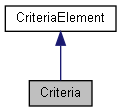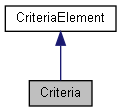◆ __construct()
| __construct |
( |
|
$column, |
|
|
|
$value = '', |
|
|
|
$operator = '=', |
|
|
|
$prefix = '', |
|
|
|
$function = '' |
|
) |
| |
Constructor
- Parameters
-
| string | $column | |
| string | $value | |
| string | $operator | |
| string | $prefix | |
| string | $function | |
A common custom in some older programs was to use "new Criteria(1, '1')" to create an always true clause, WHERE 1 = "1"
This is no longer needed and now no longer works. Instead use "new Criteria('')" or "new CriteriaCompo()", either of which will produce no WHERE clause.
The following is a temporary workaround for the old technique
◆ render()
Make a sql condition string
- Returns
- string
Reimplemented from CriteriaElement.
◆ renderLdap()
◆ renderWhere()
Make a SQL "WHERE" clause
- Returns
- string
◆ $column
◆ $function
◆ $operator
◆ $prefix
◆ $value
The documentation for this class was generated from the following file:




 Public Member Functions inherited from CriteriaElement
Public Member Functions inherited from CriteriaElement Data Fields inherited from CriteriaElement
Data Fields inherited from CriteriaElement
